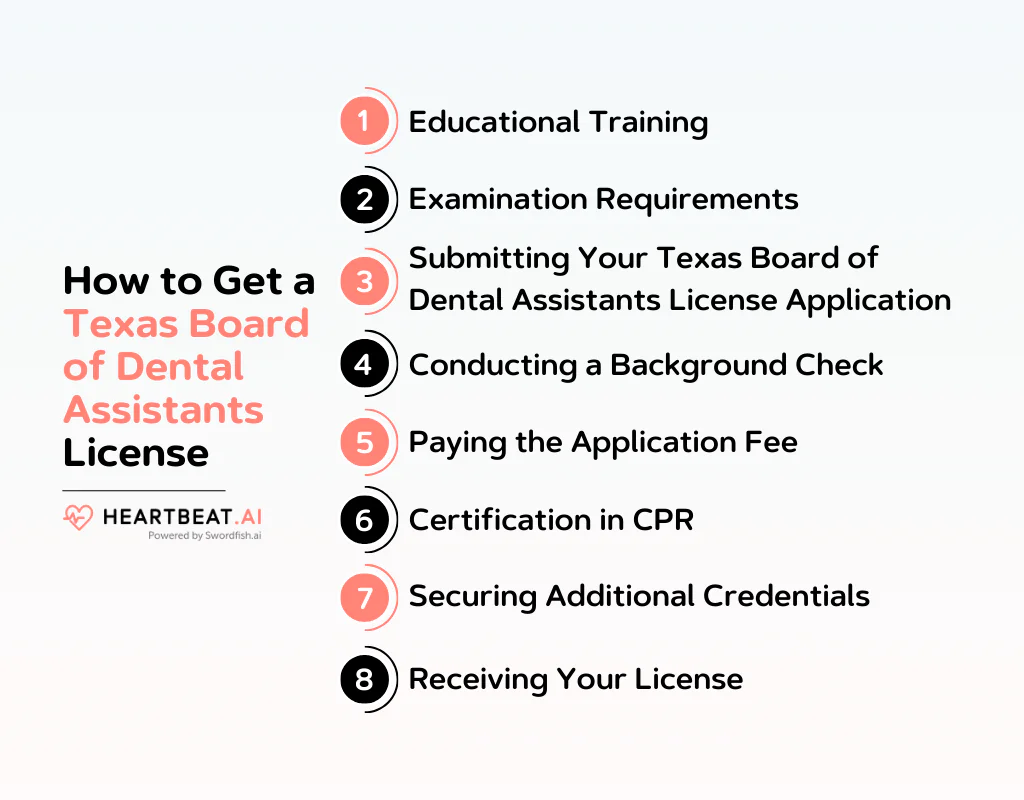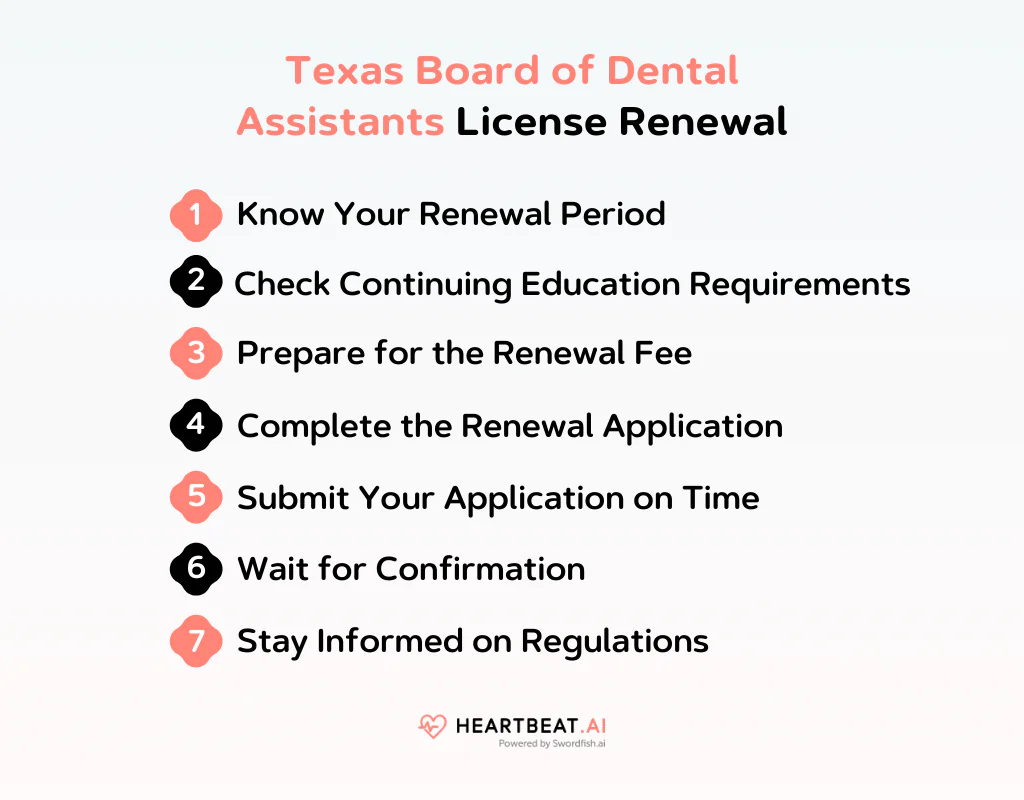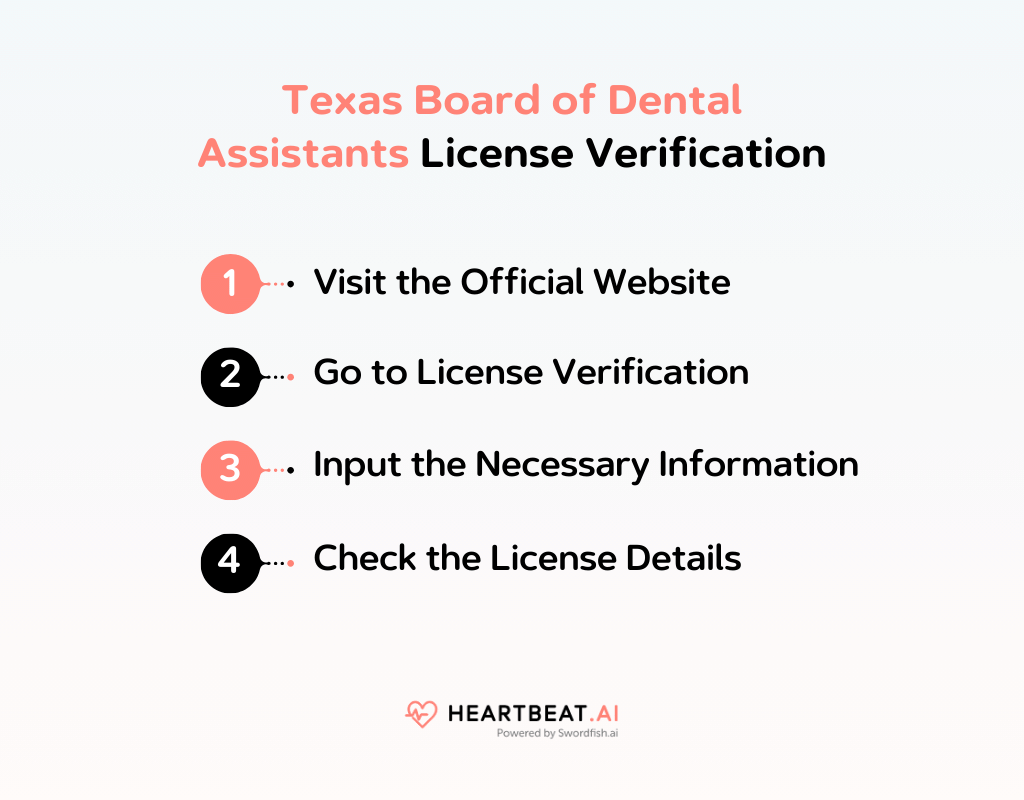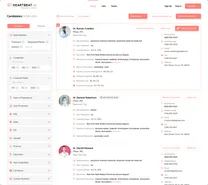In Texas, there are currently more than 29,000 licensed dental assistants. The Texas Board of Dental Assistants is in charge of setting licensure standards for dental professionals in the state. This organization also enforces the laws related to the dental assistant profession and oversees the quality of dental care provided.
The board’s goal is to make sure that every dental assistant in Texas meets important standards for safe and skilled care. Through careful supervision and following rules, dental assistants contribute to delivering top-quality healthcare services to patients.
In this article, we will explore how the board manages tasks like renewing licenses, examining applications, and checking credentials for dental assistant licenses. We will also look at how Heartbeat AI can assist you with these processes.

What’s on this page:
Texas Board of Dental Assistants: At A Glance
The Texas Board of Dental Assistants oversees and regulates dental assistants in Texas, making sure they meet high standards of professional practice and care.
The main responsibilities of the board include granting licenses to dental assistants and verifying their educational and clinical qualifications. The board also approves educational programs for dental assistants, ensuring they follow state educational guidelines.
Furthermore, it ensures compliance with regulations, addresses complaints, and takes disciplinary action against dental assistants who violate state rules.
Contact Information
- Address: 333 Guadalupe St #3-800, Austin, TX 78701
- Phone: 512-463-6400
- Website: Texas Board of Dental Assistants
What is the Texas Board of Dental Assistants Responsible for?
The Board of Dental Assistants Texas plays a crucial role in regulating and overseeing dental assistants within the state. Below are the key functions and responsibilities of the board:
- License Management and Certification: the Board handles the licensing process for dental assistants in Texas. This includes reviewing their education and training, verifying their qualifications, and administering competency exams.
- Regulation and Enforcement: TSBDE sets and enforces regulations that define the professional duties of dental assistants. These regulations specify what tasks dental assistants can perform under the supervision of a licensed dentist.
- Disciplinary Oversight: The board investigates complaints against dental assistants and takes disciplinary action if necessary. This can include issuing fines, suspensions, or revoking licenses for those who breach legal or professional standards.
- Standards for Education and Training: TSBDE approves and oversees educational programs and continuing education courses for dental assistants. It ensures that the programs meet current industry standards and provide thorough training.
- Public Information and Safety: TSBDE provides information to the public about the licensing status of dental assistants and any disciplinary actions taken against them. This transparency helps protect consumers by ensuring they receive care from qualified professionals.
- Continuing Professional Development: The board encourages dental assistants to pursue ongoing professional development. It helps them stay informed about advances in dental care, new technologies, and changes in healthcare practices.
Texas Board of Dental Assistants License Lookup
To do a Texas Dental Assistants license lookup, you should visit the official Texas Department of Health website. Once there, go to the section for Health Licensure, which handles the credentials of health professionals.
In this section, you will find the “License Verification” tool. This feature allows you to look up dental assistants by name or license number and provides important details such as the license’s current status, its expiration date, and any disciplinary actions that have been recorded.
Verifying the license is crucial to ensure that dental assistants are properly certified and meet the standards required for safe and ethical practice in Texas.
For a simpler experience, platforms like Heartbeat AI also offer a way to quickly check the licensing status of dental professionals, making it easier for those who need fast and accurate information.
Texas Board of Dental Assistants License Requirements
Here are the requirements for becoming a licensed dental assistant in Texas.
- Obtain a high school diploma or GED.
- Complete a hands-on Basic Life Support course.
- Choose one of the following; complete a TSBDE-specified training that includes dental x-ray positioning, jurisprudence, and infection control.
- Obtain DANB CDA certification and pass the Texas Jurisprudence Assessment.
- Finish a human trafficking prevention course approved by the Texas Health and Human Services Commission.
- Apply for registration with the TSBDE.
- Submit fingerprints for a criminal background check.
- Additional requirements to monitor nitrous oxide:
- Complete at least 8 hours of education and testing in nitrous oxide monitoring through a CODA-accredited program approved by the TSBDE.
- Maintain a current Basic Life Support certification.
- Apply for a nitrous oxide monitoring certificate with the TSBDE.
How to Get a Texas Board of Dental Assistants License

Here’s a guide with detailed steps for obtaining a dental assistant license in Texas:
Step 1: Educational Training
To become a dental assistant, first you need to enroll in and complete an accredited dental assistant training program recognized by the Texas State Board of Dental Examiners. This program should cover both practical and theoretical aspects of dental assisting, ensuring you’re well-prepared for your professional duties.
Step 2: Examination Requirements
Complete and pass the required examinations for dental assistants in Texas. This often includes the Dental Assisting National Board (DANB) exams, which are recognized in many states. These exams test your knowledge and skills in dental assisting to ensure you meet national and state standards.
Step 3: Submitting Your Texas Board of Dental Assistants License Application
Fill out the licensing application form provided by the Texas Dental Assistants Board. Attach all required documents, such as proof of your educational achievements and results from your examinations. Ensure all information is accurate and complete to avoid delays in the licensing application process.
Step 4: Conducting a Background Check
Undergo a comprehensive criminal background check. This step is crucial as it helps ensure that all practicing dental assistants adhere to the highest standards of safety and ethics, which are mandatory in the healthcare sector.
Step 5: Paying the Application Fee
Pay the necessary fee that accompanies your application. This fee covers the administrative costs associated with reviewing your application and maintaining licensing records. Make sure to check the current fee amount and payment methods accepted by the Board.
Step 6: Certification in CPR
Demonstrate your capability to handle emergencies by providing proof of current CPR certification. This certification is essential, as dental assistants must be prepared to respond effectively to any medical emergencies that could occur in the dental office.
Step 7: Securing Additional Credentials
If your role requires specialized skills, such as working with radiography equipment or administering nitrous oxide, you may need to obtain additional certifications. These certifications ensure you are competent in these specialized areas and comply with Texas regulations.
Step 8: Receiving Your License
After submitting your application and completing all necessary requirements, your application will be reviewed by the Texas State Board of Dental Examiners. Once everything is verified and approved, your dental assistant license will be issued.
You will then be legally authorized to work as a dental assistant in Texas. This authorization allows you to provide high-quality dental care under the supervision of a licensed dentist.
Texas Dental Assistants Board Licensure Time Frame
It typically takes the Texas State Board of Dental Examiners (TSBDE) three to four weeks to process a completed application once it is received. If an application is incomplete, it will delay the processing time.
Applicants are advised not to contact the Licensing Division to check on their application’s status unless it has been over four weeks without any communication via mail. It is crucial for applicants to fill out all parts of their application accurately to prevent any unnecessary delays.
Cost of Texas Dental Assistants Board License
The fee structure for dental assistants includes a variety of charges for applications, renewals, and specific permissions. The initial application fee is $39.00, which combines a base amount of $36.00 with an additional $3.00 in charges.
Regular renewal costs $70.00, consisting of a $63.00 base fee and an extra $7.00. If the renewal is late by 1 to 90 days, the fee increases to $85.00, which includes a base of $78.00 and an additional $7.00. For renewals that are 91 to 365 days late, the total charge is $100.00, with a base of $93.00 plus $7.00 in extra fees.
For a duplicate license or renewal certificate, the charge is $27.00, with a base fee of $25.00 and $2.00 additional. These fees are structured to cover various regulatory and administrative costs associated with maintaining standards and processing applications.
Texas Board of Dental Assistants License Renewal

Renewing your dental assistant license in Texas involves a series of steps to ensure you can continue working without interruption. Here’s a simplified guide to the renewal process:
Step 1: Know Your Renewal Period
In Texas, dental assistant licenses need to be renewed every two years. It’s important to know when your license expires to prevent any gap in your ability to practice.
Step 2: Check Continuing Education Requirements
Although Texas does not currently require continuing education for dental assistants, it’s beneficial to stay updated with the latest practices and certifications. Make sure to check for any changes in this policy, as regulations may evolve.
Step 3: Renew Online or by Mail
The TSBDE provides two options for license renewal: online or by mail.
Online Renewal:
- Visit the TSBDE website and log in to your account.
- Follow the prompts to renew your license, entering your information as requested.
- Pay the renewal fee using a credit or debit card.
Renewal by Mail:
- Download and complete the paper renewal form from the TSBDE website.
- Include the application payment receipt or money order for the renewal fee, payable to the TSBDE.
- Mail the form and payment to the TSBDE office.
Step 4: Submit the Application
Once you’ve completed the application requirements, it’s time to submit it. For online renewal application submissions, simply submit the application after entering your information and paying the fee. For mail submissions, send the completed form and payment to the address provided on the form.
Step 5: Wait for Confirmation
After submitting your application, wait for confirmation from the TSBDE. The board typically processes renewals within a few weeks. You will receive confirmation once your renewal is approved. Keep a copy of your renewed license handy for display at your place of work.
Step 6: Update Your Records
Finally, update your records accordingly. Inform your employer once your license is renewed, and maintain copies of your CE certificates and renewal confirmation for future reference.
Texas Board of Dental Assistants License Verification

Verifying the license of a dental assistant in Texas is an important step to ensure that the assistant is properly certified and adheres to state regulations. Here’s a straightforward guide to help you check a dental assistant’s license:
Step 1: Visit the Official Website
Start by going to the Texas State Board of Dental Examiners’ official website. This site provides various resources related to health, including information on licensing and regulation for healthcare professionals.
Step 2: Go to License Verification
On the website, look for a section called “License Verification.” This can usually be found under the menu for regulatory activities or directly from the homepage.
Step 3: Input the Necessary Information
The license verification feature lets you search for a dental assistant’s license using details such as their name, license number, or other identifiers. Make sure you enter this information accurately to find the correct license details.
Step 4: Check the License Details
Once you submit your search, the system will show details about the dental assistant’s license. This includes the type of license, its current status (active, expired, suspended, etc.), expiration date, and any disciplinary actions if applicable.
How Often Do Dental Assistants Licenses Need to be Renewed in Texas?
Registered Dental Assistants (RDAs) are required to renew their registration every two years. It is essential that they complete this renewal process by midnight on the day their current license expires. This timely renewal ensures they maintain their legal right to continue practicing.
How Does Heartbeat AI Simplify the Process of Getting & Renewing a Dental Assistants License in Texas?

Here’s how Heartbeat AI can improve the process of obtaining and renewing dental assistant licenses in Texas:
Extensive Database Access
Heartbeat AI provides access to a large database with information on over 11 million healthcare workers in the U.S. This database makes it easy to communicate using readily available contact details.
Consistently Updated Information
The platform sources its data from more than 200 reliable sources, ensuring that the contact information for dental assistants is current. This updated information is crucial for staying informed about changes in the dental sector and making connections with active professionals.
Effortless Networking
Heartbeat AI’s Chrome Extension makes it easier to connect with other healthcare professionals. This tool is useful for seeking advice, discovering career opportunities, or finding mentors within the healthcare field.
Improved Search Capabilities
With our Prospector Tool, users can search for healthcare workers using various criteria, such as location, specialty, and experience. This way, you can easily find any dental provider with the minimum information given.
Authentic Contact Information
Heartbeat AI offers a File Upload feature that allows you to verify and correct contact lists, ensuring they are accurate and reliable. This feature supports effective communication for official purposes and networking.
Conclusion
In conclusion, we have discussed the role of the Texas Board of Dental Assistants in regulating dental assistant practices across Texas. Dental assistants in Texas must strictly follow the board’s regulations to keep their licenses and provide high-quality care to patients.
If you’re seeking an efficient method to connect with licensed dental assistants in Texas and streamline your licensing activities, consider using Heartbeat AI. This user-friendly platform allows you to effortlessly check your license status and explore information about other dental professionals. This way, you have more time to focus on patient care.
Frequently Asked Questions
Can I perform all dental procedures once licensed as a dental assistant in Texas?
No, licensed dental assistants in Texas are limited to performing certain tasks which are outlined by the Board. Specific procedures that require additional certification, such as nitrous oxide monitoring, require further training and certification.
What happens if I move to Texas with a dental assistant license from another state?
If you move to Texas with a dental assistant license from another state, you must apply for licensure by credentials. This process typically involves submitting proof of your current license, and educational qualifications, and sometimes passing the Texas jurisprudence exam.
Are there any penalties for practicing as a dental assistant in Texas without a license?
Yes, practicing as a dental assistant without a valid license in Texas is illegal and subject to penalties. These can include fines, legal action, and the inability to obtain licensure in the future.

